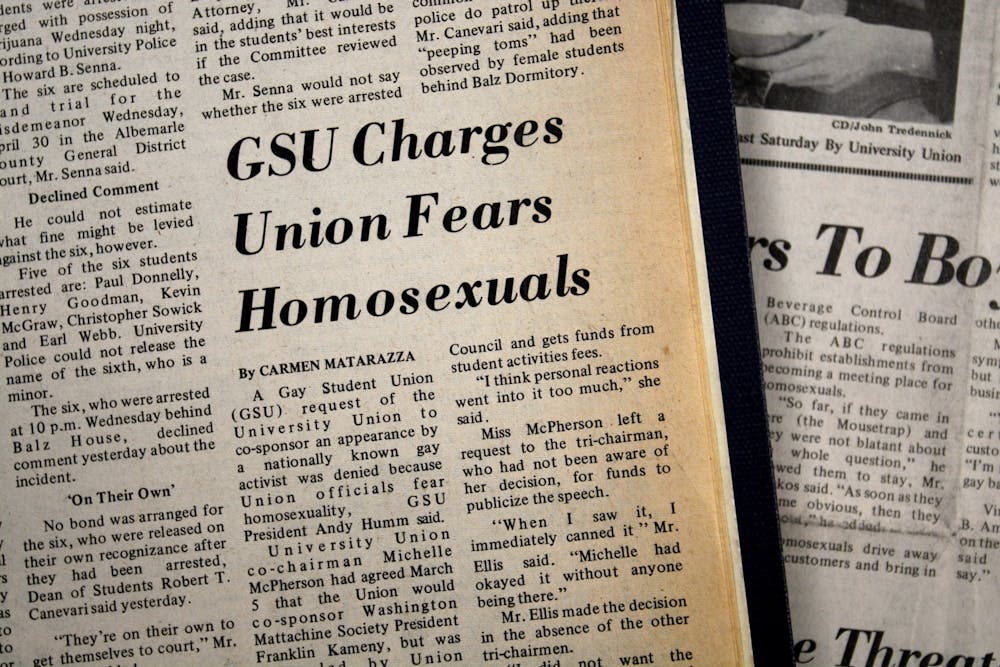Board of Visitors appointee Bert Ellis denied a request by the Gay Student Union for the University Union to co-sponsor an event headlined by pioneering gay rights activist Frank Kameny in 1975, coverage from The Cavalier Daily’s archives show.
The decision came just a month after Ellis and the Union had also been at the center of controversy for hosting a debate featuring William Shockley, a prominent eugenics supporter. Though the Black Student Alliance and Student Council told Ellis and the Union to cancel the debate — titled “The Correlation Between Race and Intelligence” — the event took place in February 1975 during the first week of Black History Month.
Ellis did not respond to a request for comment.
The University Union — which was later renamed the University Programs Council — was a group tasked with organizing concerts, speakers, debates and other social opportunities for students during the semester. As tri-chairman and spokesman, Ellis led the organization, alongside two additional tri-chairmen.
In March 1975, GSU had requested the University Union co-sponsor an appearance by Kameny. Dismissed from the U.S. Army’s Army Map Service on account of his sexuality, Kameny appealed his firing, co-founded the D.C. branch of the gay rights organization the Mattachine Society and dedicated the rest of his life to activism.
“Years before the gay rights movement existed in any widely recognized form and in an era in which open assertion of homosexuality could invite physical harm, Mr. Kameny worked to increase the acceptance of gay men and lesbians in mainstream American society and to win recognition of their equality under the law,” a Washington Post obituary of Kameny following his death in 2011 reads.
GSU president Andy Humm said the group was not seeking money from the Union to pay Kameny to speak. Rather, Humm thought it would be wise to seek the Union’s co-sponsorship of the event in order to access funding for publicity and increase advertising efforts.
Founded in 1972 at the University, GSU was later renamed the Lesbian and Gay Student Union and today is known as the Queer Student Union. The group celebrated its 50th anniversary just last year.
Humm began his time at the University in 1971, just a year before the GSU’s founding. In an interview with The Cavalier Daily, Humm said he was closeted when he arrived at University, and faced harassment — he recalled students tearing down posters advertising GSU events and an incident in which an individual defaced his driveway with phallic grafitti.
“My first day at U.Va., in 1971, I saw two men holding hands on campus,” Humm said. “I felt very isolated because I was closeted.”
It wasn’t until his fourth year that Humm ran for president of the GSU, which he called a “life-changing experience.” Humm was eager to have Kameny speak at an event — Kameny was a prominent activist in the 1970s, a decade that saw transformative events which transformed the gay liberation movement, such as the Stonewall riots.
Per an article dated March 21, 1975, Union tri-chairman Michelle McPherson had agreed that the Union would sponsor the event, but was overruled by Ellis just two days later.
“When I saw it, I immediately canned it,” Ellis said in an interview for the article. “I did not want the University Union associated with the GSU.”
Ellis added he made the decision in the absence of the other tri-chairmen.
“In view of the student population here, it is not the type of activity the University Union should sponsor,” Ellis continued. “[Homosexuality] is not an issue viewed highly in the University … It would not help the University Union’s position and prestige.”
McPherson said “there was no logical reason” the Union couldn’t sponsor the event, adding she felt “personal reactions” went into the decision to withdraw from sponsoring the event.
Ultimately, Humm said he thinks Ellis’ opposition to the Kameny event highlights a hypocrisy over free speech. Though Humm said he thought the Union would be willing to cosponsor the event in the spirit of hearing all sides, this was not the case.
“The spirit of the day was, ‘okay, we’re going to hear from everybody,’” Humm said. “But of course, Bert Ellis did not want anybody to hear from Frank Kameny. That’s his hypocrisy.”
Today, free speech has been one of Ellis’ key priorities as president of the conservative alumni group the Jefferson Council. The group’s other priorities include reinvigorating the Honor system, maintaining the appearance of the Lawn as a UNESCO World Heritage Site and preserving Thomas Jefferson’s legacy.
His appointment to the Board by Governor Glenn Youngkin was met with pushback from Student Council, who alleged Ellis “selectively leverages free speech discourse” in an Executive Board statement.
“He’s using phrases like ‘free speech’ and things like that, but he doesn’t believe in that,” Humm said. “He never did.”
CORRECTION: A previous version of this article stated that the University Union no longer exists — the Union is now called the University Programs Council, and plans educational and entertaining activities and events. The article has been updated to reflect this distinction.







